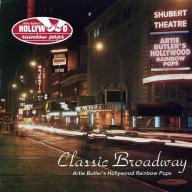After Lieber and Stoller sold Red Bird to George Goldner in 1966, Butler remained on the Barry/Greenwich payroll, arranging records including Neil Diamond's early hits Solitary Man and Cherry Cherry. He relocated to Los Angeles in 1967 and a year later signed with AM Records to record Have You Met Miss Jones?, a collection of bossa nova-inspired instrumentals featuring up-and-coming jazz luminaries including keyboardist Herbie Hancock and bassist Ron Carter. During his AM tenure Butler also devised the memorable piano figure to Joe Cocker's 1969 smash Feelin' Alright, soon after leaving the label to work as a freelancer, arranging a decade's worth of pop hits including Armstrong's 1970 crossover hit What a Wonderful World, Paul Revere the Raiders' 1971 Indian Reservation, Vicki Lawrence's 1973 The Night the Lights Went Out in Georgia, Neil Sedaka's 1975 Laughter in the Rain, Manilow's Copacabana, and Dionne Warwick's Grammy-nominated I Know I'll Never Love This Way Again. At the same time Butler also emerged as a Hollywood composer and arranger of some renown, scoring 1972's #What's Up, Doc? (the first of several collaborations with filmmaker Peter Bogdanovich) and 1977's animated Disney feature #The Rescuers. Film and television became his primary focus in the decades to follow, and in 1992 he earned an Emmy nomination for his work on the CBS miniseries #Sinatra. In 2004 Butler reunited with Mike Stoller to compose +Laughing Matters, a theatrical musical with lyrics by Iris Dart that premiered in New York City two years later. ~ Jason Ankeny, Rovi
Artie Butler
from Brooklyn, NY
December 2, 1942 (age 83)
Biography
The hitmaking career of arranger and composer Artie Butler embraces the breadth of American popular music from the girl group sound to the disco era. A onetime protégé of the legendary songwriting team of Jerry Lieber and Mike Stoller, his list of credits is staggering, spanning more than 100 chart blockbusters including the Drifters' On Broadway, Louis Armstrong's What a Wonderful World, and Barry Manilow's Copacabana. Born December 2, 1942, in Brooklyn, NY, as a child Butler poured over jazz magazines like Downbeat and Metronome, at various times studying piano, clarinet, and drums. At 13, he entered the New York City offices of King Records on a whim, auditioned for exec Henry Glover on a rehearsal piano and landed a record deal on the spot, releasing the RB-inspired Lock, Stock and Barrel on the label's DeLuxe subsidiary in mid-1954. The single went nowhere, and after a brief return to teenage anonymity, Butler resurfaced when the pianist scheduled for a Lieber/Stoller session went AWOL. He remained a staple of their Brill Building studio crew for years to come, contributing to classic records including the Drifters' Up on the Roof and Ben E. King's Gettin' to Me. In 1963 Butler earned his first assignment as an arranger, teaming with producer Abner Spector for the Jaynettes' supernatural girl group classic Sally, Go Round the Roses. Later that same year, he signed on as a session keyboardist with the songwriting tandem of Jeff Barry and Ellie Greenwich, joining a studio crew that also featured Al Gorgoni on guitar and Buddy Saltzman on drums. Barry and Greenwich later joined forces with Lieber and Stoller to form Red Bird Records, and Butler appears on most of the label's blockbusters including the Shangri-Las' Leader of the Pack, the Dixie Cups' Chapel of Love, and the Ad Libs' The Boy from New York City. He also teamed with Lieber to write Alvin Robinson's 1964 Red Bird release Down Home Girl, launching his career as a songwriter.
Top Tracks
Albums
Videos
Close












